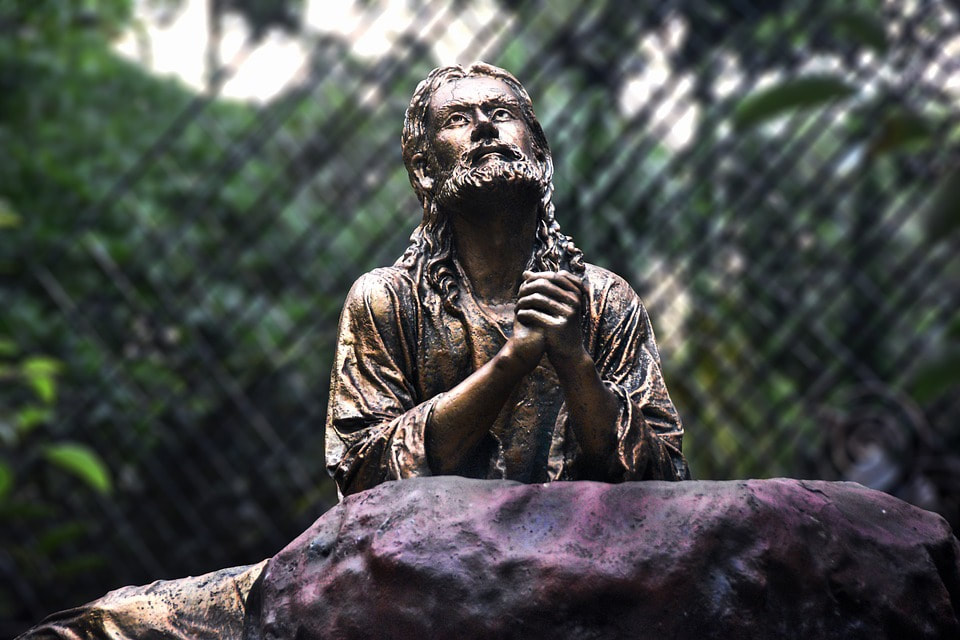|
Jesus' struggle in the garden began earlier than that moment when we see him anguishing in Gethsemane. After the crowd welcomes Jesus, blessing him on what we celebrate as Palm Sunday, we see him teaching his disciples. He is trying to prepare them for what lies ahead. John 12:23-28: Jesus replied, “The hour has come for the Son of Man to be glorified. Very truly I tell you, unless a kernel of wheat falls to the ground and dies, it remains only a single seed. But if it dies, it produces many seeds. Anyone who loves their life will lose it, while anyone who hates their life in this world will keep it for eternal life.Whoever serves me must follow me; and where I am, my servant also will be.My Father will honor the one who serves me. “Now my soul is troubled, and what shall I say? ‘Father, save me from this hour’? No, it was for this very reason I came to this hour. Father, glorify your name!” In these moments we see teacher Jesus masterfully describing death and resurrection using the analogy of a seed. But then he moves from instructional to vulnerable. He gives his followers a front row seat to both his humanity and his divinity. He knows why he came. He knows what must happen. Yet his soul is troubled. Even here we see that he is sifting through conflicting thoughts. Between these moments and the garden we see Jesus teaching, washing his disciples feet, sharing final words as he partakes in the last supper he will share with his followers. He tells them to love as he has loved them. He warns them to not falter in faith. He comforts them. He reminds them that he is the Way, the Truth, the Life, and the only way to the Father. He promises the Holy Spirit and admonishes them to remain in his love. He calls them friends. And then he prays. He prays to be glorified. He prays for his disciples and for all believers. Which means he prays for us. Matthew 26:36-39 records Jesus' prayer in the garden: Then Jesus went with his disciples to a place called Gethsemane, and he said to them, “Sit here while I go over there and pray.” He took Peter and the two sons of Zebedee along with him, and he began to be sorrowful and troubled. Then he said to them, “My soul is overwhelmed with sorrow to the point of death. Stay here and keep watch with me.” Going a little farther, he fell with his face to the ground and prayed, “My Father, if it is possible, may this cup be taken from me. Yet not as I will, but as you will.” In her book The Prayer Coin, Daring to Pray With Honest Abandon, Elisa Morgan says this about Jesus' two-sided prayer: "Two opposite pleas pierce Jesus' final night on earth before the Father. On the one hand, he leans human. On the other, he surrenders divine. That he does both at once is stunning." Jesus was honest and vulnerable with his Father. He was honest and vulnerable with his friends, asking them to come along and pray with him. And at the same time, his will was surrendered to his Father's. He was strengthened through vulnerable, surrendered prayer. Moments later, when he is being arrested, Peter strikes the high priest's servant, cutting off his right ear. Jesus commands Peter, "Put your sword away! Shall I not drink the cup the Father has given me?" (John 18:10-11) Jesus lived a life of prayer and he invites us to do the same. He invites us to bring it all--our fears and struggles and sorrows--and pour it all out. He invites us to be as honest as humanly possible with our Father who knows us and loves us. And he calls us to total surrender, not to our will, but to his. Then he strengthens and empowers us to do his will--his good, pleasing, and perfect will. Categories
Comments are closed.
|
Sign up for updates:
Archives
January 2024
|


 RSS Feed
RSS Feed